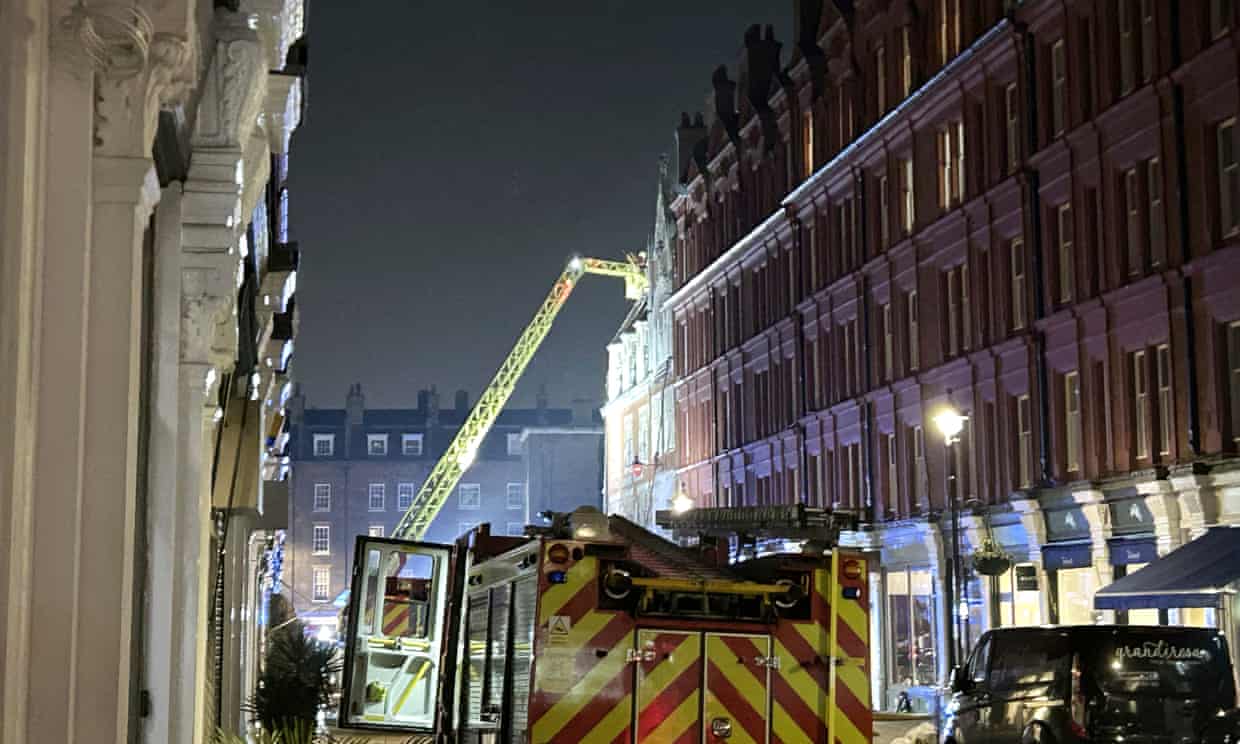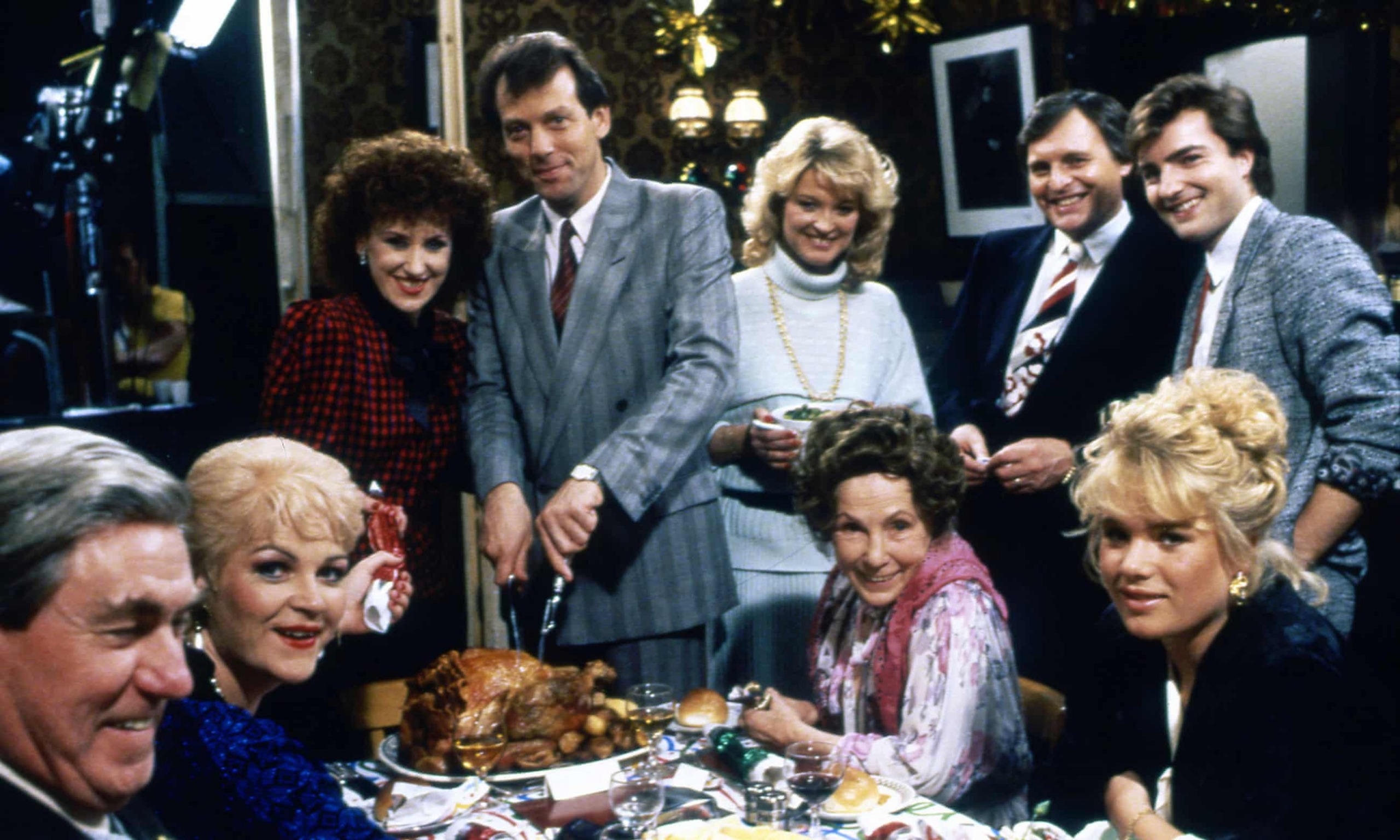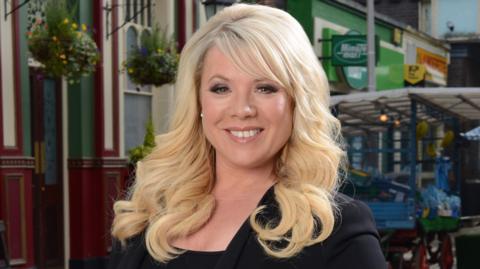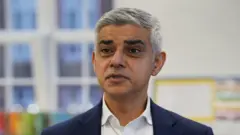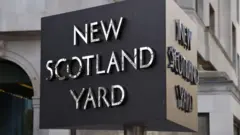‘Cor, stinks in here, dunnit?” At 7pm on 19 February 1985, we heard Simon May’s now-familiar theme tune and watched those wriggly River Thames titles for the first time – followed by that aromatic opening line of dialogue.
The BBC’s new soap opera was its attempt to make a mass-market, twice-weekly rival to ITV’s Coronation Street. Co-created by the producer Julia Smith and the writer Tony Holland, the gritty saga was set in a Victorian square in the fictional east London borough of Walford. Working titles for the show included Square Dance, Round the Houses and London Pride. They settled on EastEnders.
Overnight ratings were an impressive 17m. Audiences would peak at an astonishing 30m the next year. To this day, four EastEnders episodes feature in the UK’s Top 10 most-watched TV programmes of all time (not including sports or news coverage).
After more than 7,000 episodes, the BBC is celebrating this week’s 40th anniversary with misty-eyed documentaries, interactive storylines and a fully live edition. Here, we mark the milestone by recounting its 40 most memorable moments, aided by its creators and stars. Altogether now: “Get outta my pub!”
Our arrival in E20 was a portent of the dark drama for which the soap would become known. Neighbours broke into 23 Albert Square, worried about Reg Cox (Johnnie Clayton). They found the pensioner dead in his armchair, killed by “Nasty” Nick Cotton (John Altman) for his war medals. Welcome to Walford.
The teenage pregnancy of Michelle Fowler (played by Susan Tully) prompted the show’s first talking-point mystery: the identity of the father. Four Walford men were in the frame. At a canalside rendezvous, it was revealed to be the Queen Vic’s publican, Den Watts (Leslie Grantham). He wasn’t nicknamed “Dirty Den” for nothing.
Among the most famous scenes in ’Enders history. A record 30.1 million viewers spat out their Babycham in shock when dastardly Den handed his wife, Angie (Anita Dobson), divorce papers and growled a festive platitude for the ages.
Driven to desperation by unemployment, the Fowler patriarch, Arthur (Bill Treacher), “borrowed” the Christmas Club money to pay for Michelle’s wedding. His mental collapse culminated with “Arfur” smashing up the decorations and falling in a sobbing heap by the tree.
The actor turned activist Michael Cashman sparked media hysteria before his character even appeared on screen. When Cashman was cast as the gay graphic designer Colin Russell, the Sun ran the front-page splash “EastBenders”. “In the midst of the Aids pandemic, Thatcher’s government and widespread homophobia, the fact that they were introducing a gay character at all knocked me sideways,” says Cashman. “It took huge courage from the BBC. That headline was a foretaste of what was to come.”
The News of the World outed Cashman’s real-life partner, Paul (“I was fair game, but to come after Paul was unforgivable”), even identifying the area where the couple lived. Within hours of the edition hitting newsstands, a brick was thrown through their window. “In a strange way, it gave me strength,” says Cashman. “As I picked up the brick, I vividly remember thinking: ‘If you think you can intimidate me …’”
Colin was already trailblazing as the first openly gay character in a British soap. He made TV history when he kissed his boyfriend, Barry (Gary Hailes), on the forehead. “The enormity of it didn’t occur to us. There were questions in parliament. Rent-a-quote politicians said the show should be taken off-air. But judging by the many letters I received, the public was much more tolerant. At a time when there were no role models on TV, it made gay people feel less alone. We broke stereotypes and helped push forward positive change.”
A year later, Colin kissed his new boyfriend, Guido (Nicholas Donovan), on the lips. “Apart from Piers Morgan, who described it in the Sun as ‘a love scene between yuppie poofs’, the second kiss passed without much outcry. The first one caused a storm. This time, there was hardly a breeze.” (Morgan subsequently apologised for his offensive remarks.)
Cashman capitalised on his primetime fame to lead the campaign against section 28 – government legislation that banned the teaching, publication or promotion of homosexuality. “To their credit, not once did the BBC warn me off. The only person I checked with was June Brown, who played Dot Cotton, because we were supposed to be filming together on the day of the protest march. June was a one nation Tory, but she arranged for me to get time off. That moment defined the rest of my life. If it wasn’t for that, I wouldn’t have founded Stonewall with Ian McKellen or be in the House of Lords now. EastEnders helped me find my voice – and the conviction to use it.”
The show ventured into cockney gangster territory when bad boy Den was shot by a hired hitman, concealing his gun in a bunch of daffodils. The publican fell into the canal and was presumed dead.
In a groundbreaking Boxing Day episode, Mark Fowler (Todd Carty) told his parents he was HIV positive – the first major soap character to be diagnosed. The storyline was written in collaboration with the Terrence Higgins Trust.
It has to be a big scandal to be awarded the “gate” suffix. This love triangle inspired by Tristan and Isolde made the grade. Grant (Ross Kemp) and Sharon Mitchell’s stormy marriage led to her crying on the shoulder of her brother-in-law, Phil (Steve McFadden). It soon tipped over into an affair. Sharon drunkenly confessed one night to her best mate, unaware they were being recorded. A devastated Grant discovered the tape and played it to a packed pub at Phil’s engagement party – before drying his eyes and beating his big brother unconscious.
“Sharon and Phil always had a spark,” says Letitia Dean, who plays Sharon. “It had been breadcrumbed throughout, so it was exciting to bring it to fruition. None of us predicted what an impact it would have. Reaction went through the roof. People came up to me in supermarkets and said: ‘She’s a naughty one, that Sharon. But I get it; Phil is much kinder to her.’ I’m still asked about it to this day – and it happened over 30 years ago.”
The pub showdown took two days to film. “Most of the cast were involved and you need to capture the drama from multiple perspectives. When Grant played the tape, you could’ve heard a pin drop.” She laughs. “Trust me, it’s rare to have complete silence in the Vic during filming.”
Phil’s fiancee, Kathy, reacted to the betrayal by slapping Sharon and calling her a slut. “Back in the day, we didn’t have a stunt coordinator and slapped each other for real,” says Dean. “All I said to Gillian Taylforth, who plays Kathy, was: ‘Mind my ear.’ The fashion was very much of its time, so I had big earrings that would make Pat Butcher proud. I’m old school: I prefer a real slap for authenticity. But it was quite a gentle, showbiz one.”
The slow-burn storyline took two years, pulling in 25 million viewers at its peak. “That’s what I love about EastEnders,” says Dean. “Plots are given time to build and then bang, the drama hits.” After four decades, Dean still savours those episode-closing “doof doof” moments: “You have to hold the position and the emotion for longer than usual. After the director calls cut, I always burst out laughing.”
“You bitch!” “You cow!” A textbook battle of the matriarchs erupted and peroxide-blond blows were traded as Peggy Mitchell (Barbara Windsor) fought Pat Butcher (Pam St Clement) for the affections of Frank (Mike Reid).
“Tiff the Stiff” screamed the Daily Star. When her abusive ex, Grant Mitchell, snatched their daughter, Courtney, the beloved barmaid (played by Martine McCutcheon) chased them across the road and was run over by Frank Butcher.
When an old flame, Saskia (Deborah Sheridan-Taylor), taunted the nightclub owner Steve Owen (Martin Kemp) about aborting his baby, Steve hit her with a marble ashtray, buried her body in Epping Forest and framed his resident DJ. Charming.
The siblings fought over Grant sleeping with Phil’s ex, Kathy. A tearful Phil held Grant at gunpoint, forced him to drive at high speed and the car plummeted into the river. Bang went their no-claims bonus.
Knock knock. Who’s there? Frank on Pat’s doorstep, wearing nothing but a light-up dickie bow. A seduction technique that remains seared in viewers’ memories.
“Dorothy Cotton, I’m arresting you on suspicion of possessing class B drugs.” Dear old Dot became an accidental stoner when she mistook cannabis for herbal tea, served a cuppa to a policeman and got nicked. No wonder she fainted in shock.
The cult heroine Sonia (Natalie Cassidy) will soon depart after a 32-year stint on the show. She was once the centre of a teen pregnancy storyline. The trumpet-playing schoolgirl had no idea she was pregnant – until she went into labour and gave birth to a daughter.
It was decades before the assisted dying debate when terminally ill Ethel Skinner (Gretchen Franklin) begged her best friend, Dot, to help end her life. Conflicted by her Christianity, Dot eventually agreed and they bade an emotional farewell.
The Slater sisters took Albert Square by storm when they arrived in 2000 – except, of course, there was a twist in store. Young Zoe (Michelle Ryan) fell out with protective Kat (Jessie Wallace), storming off with the words: “You can’t tell me what to do. You ain’t my mother.” The country gasped when Kat screamed back: “Yes I am!” It became one of the most quoted lines in soap history.
The gravel-voiced hardman was the subject of a JR-from-Dallas-style whodunnit when he was gunned down on his doorstep by a mystery assailant. The culprit turned out to be his ex-girlfriend Lisa Fowler (Lucy Benjamin). That’ll teach him. (Spoiler: it didn’t teach him.)
Little Mo Slater (Kacey Ainsworth) suffered horribly at the hands of her abusive husband Trevor Morgan (Alex Ferns). On New Year’s Eve, he attacked her yet again and she hit him with an iron in self-defence. Little Mo thought she had killed him, only to return with her sisters to find Trevor gone.
“His first line back had to be: ‘Hello, princess.’ Anything else would have been a letdown,” says the screenwriter Sarah Phelps, who worked on EastEnders for more than a decade, penning nearly 100 episodes. These included the momentous week when the original Queen Vic landlord, Den Watts, swaggered back into Albert Square and surprised his daughter Sharon – who, like 16 million viewers, thought he was long dead.
“Being let loose on such an iconic character was a joy,” says Phelps. “It was so embargoed and secretive. We went for a drink after a script meeting and I left my notes in the pub. I realised in a panic and have never run so fast in my life. Thank God the folder was still there.” In the reunion scene, Sharon is stunned into silence, then vomits in a nightclub toilet. “It was shellshock,” says Phelps. “A bomb exploded in her life. Was she going to throw herself into his arms? No, she’s going to throw up. That’s what I’d do.”
She laughs off accusations that the storyline was far-fetched. “I went on Radio 4 and Mark Lawson asked me: ‘This is nuts, isn’t it?’ I said: ‘Is it?’ Look at John Darwin, the canoe man. Nothing is more implausible than reality. People walk out of their lives all the time. Sometimes, they walk back.”
Dirty Den’s return formed part of an incest storyline. “I was pretty new to EastEnders and pitched an affair between Sharon and Young Dennis, her adoptive brother. This was really taboo. I got letters saying: ‘You are filth! I turned it off and only turned it on again to see who’d written it.’ Then we threw Old Dennis into the mix as well. The old lion comes back to find this new lion on his patch. What a gift to write.”
His homecoming sparked a ratings resurgence and was voted viewers’ favourite soap comeback. Phelps completed the circle 18 months later by writing Den’s second murder – this time for real – by three wronged Walford women: “I wanted it to be mythic. These Furies bringing down vengeance.” Now a Bafta-winner, Phelps says she learned her craft on EastEnders: “Soaps are the crucible of TV. If you can do it on a soap, you can do it anywhere. It’s the people’s theatre. Greek tragedy with acrylic nails. It’s epic, it’s huge and I love it.”
On a vitriolic rant during their Highland honeymoon, Janine Butcher (Charlie Brooks) told the buffoonish Barry Evans (Shaun Williamson) that their marriage was a sham and shoved him off a cliff. As if that wasn’t enough, she followed him down and taunted him as he died.
Festive season is always eventful in the winter wonderland of Walford. So it proved when the extended Branning-Slater family sat down to open their presents in front of the TV. Bradley Branning (Charlie Clements) was given a DVD of his wedding day. Everyone said he should play it – only to be stunned into silence when the footage included the bride, Stacey Slater (Lacey Turner), snogging her father-in-law, Max (Jake Wood).
“As soon as the audience saw that kiss accidentally being captured on a camcorder, it became like a ticking timebomb,” says Turner. “This is EastEnders – of course the affair would be exposed! Nothing stays secret for ever in Albert Square. It wasn’t a case of whether it would come out, but when. The storyline unfurled slowly, so the audience was fully invested. That made it all the more tense.”
The sitting room scene was deeply awkward, as it dawned on different generations what they were watching. “The looks on everyone’s faces were brilliantly excruciating!” says Turner, laughing. “We shot it in only two takes. It was very naturalistic, almost like it was happening in real life.”
“I grew up watching EastEnders with my family and you always knew the Christmas episodes were going to be especially dramatic,” she says. “Filming feels extra special when you know it’s the Christmas Day episode. The response was huge. I was always being told by grannies on the street that Stacey should ‘just settle down with that lovely boy Bradley’, or asking: ‘What are you doing with Max?’ I was constantly getting warned off him by viewers.”
With her husband, Jim Branning (John Bardon), hospitalised with a stroke, Dot recorded a touching half-hour message for him. The Talking-Heads-style monologue remains the soap’s only single-hander episode and earned June Brown a Bafta nod.
Larry Lamb made a textbook villain as the evil Archie Mitchell. When he was fatally bashed over the head with the Queen Vic bust, there was no shortage of suspects. In the show’s first live episode, the killer was unmasked as Stacey Slater.
This storyline saw the closeted Syed Masood (Marc Elliott) conduct a secret affair with Christian Clarke (John Partridge). Syed revealed the truth on the morning of his traditional Pakistani wedding, but his mother, Zainab (Nina Wadia), put pressure on him to go through with it anyway. Cue a spectacular but poignant horseback procession through the square.
After losing custody of his daughter, Louise (then played by Brittany Papple), Phil Mitchell turned to crack. The scenes trended on social media and drew complaints for its pre-watershed drug use. Phil soon accused his mum, Peggy, of loving the Queen Vic more than him and then set the pub on fire. Just say no, kids.
Meme immortality was assured when the vampish Vanessa Gold (Zöe Lucker) realised her lover Max Branning had gone back to his wife. In a jealous rampage, she trashed her own sitting room and stabbed a photo frame while repeatedly muttering: “Bubbly’s in the fridge.”
The plot that drew the biggest backlash in the show’s history. After Ronnie Branning (Samantha Womack) lost her baby, she switched him with Kat Slater’s newborn son. A record 14,000 complaints prompted producers to cut the divisive storyline short.
“I’ve got nothing left!” sobbed Ian Beale (Adam Woodyatt) after his daughter Lucy’s murder. Oddly, he sought comfort in the arms of his arch enemy, Phil Mitchell, who called him “Beale the Squeal” and once flushed his head down the toilet. It become a tear-sodden gif to rival James Van Der Beek blubbing in Dawson’s Creek.
The pub landlord Mick Carter (Danny Dyer) planned a festive proposal to his sweetheart Linda (Kellie Bright), but discovered she had been raped by his “nephew” Dean Wicks (Matt Di Angelo). As Mick tipped over the Christmas dinner table and punched Dean, the immortal words rang out: “He’s your bruvva!”
The 30th anniversary live episode was built around the unmasking of Lucy’s killer. Yet the most memorable moment came when Tanya Branning accidentally asked: “How’s Adam?” when referring to Ian Beale, played by Adam Woodyatt. Jo Joyner gamely tweeted: “At least you know it’s live #gutted”.
Nick Cotton was the bane of his mother’s life. Who could blame Dot for abandoning her religious principles? After scoring heroin for her addict son, which turned out to be “bad gear”, she ignored his pleas for an ambulance to simply “let Jesus decide”.
Sharon tottered into the Arches garage one lunchtime to find her husband Phil Mitchell harbouring a mystery woman. Spotting a discarded sandwich, Sharon muttered: “Cheese and pickle? Basic.” T-shirts were printed. Drag queens lip-synced the line.
Max Branning was wrongly convicted for killing Lucy Beale (then played by Hetti Bywater). The real culprit was Lucy’s younger half-brother. After 10-year-old Bobby (then played by Eliot Carrington) hit his mum, Jane (Laurie Brett), over the head with a hockey stick in rage, he burst into the packed pub and blurted out: “I’ve killed Mum, just like I killed Lucy.” Gasp.
With terminal breast cancer, the Mitchell matriarch, Peggy, returned for a poignant farewell. Hallucinating the smell of cigarette smoke, she saw a vision of old frenemy Pat, “earrings rattling like Marley’s bleedin’ chains”. After Pat promised to stay by her side, Peggy took an overdose of her pills.
Ronnie and Roxy Mitchell (Rita Simons) were fan favourites. Hearts were doubly broken when they were killed off together. After Ronnie’s wedding, they snuck into a swimming pool, swigging from a champagne bottle. Roxy leapt in and failed to resurface. Ronnie tried to rescue her, only to be dragged down by the weight of her bridal gown.
Sharon Mitchell fell for the teen toyboy Keanu Taylor (Danny Walters) while Phil was away doing dodgy deals in Spain. The pair acquired the portmanteau name “Sheanu”. Phil unexpectedly returned as Keanu was tied to the bed with fluffy pink handcuffs. Awkward.
When the Queen Vic won a Thames boat party for being Pub of the Year, it proved anything but a happy occasion. A fun-packed night took in fights, drug overdoses, the boat crashing, Sharon Watts (formerly Mitchell) going into labour and Ian Beale accidentally killing her son. Anchors away.
EastEnders specialises in surprise comebacks. The most recent – and with the longest gap between appearances – was Cindy Beale’s dramatic rise from the dead after 25 years.
“When I got the phone call, I had to sit down,” says Michelle Collins. “I told my agent that the only way it could be believable was if Cindy had faked her death and gone into witness protection. That was exactly what producers pitched. I gasped and went: ‘Oh my God, this could actually work.’ The sole frustration was that I had to keep it secret for a year. I went to rehearsals in a blacked-out car and had a fake name in the script.”
The new Queen Vic landlord, George Knight (Colin Salmon), arrived in the square, still mourning his fabled ex, Rose, who had disappeared without trace. After closing time, he put Seal’s Kiss from a Rose on the pub jukebox and tried to phone her. Cut to a familiar face at a poolside in France, ignoring the call: femme fatale Cindy, who had supposedly died in prison back in 1998.
“It was very camp, like: ta-da, she’s back!” laughs Collins. “I even had a wind machine on my hair. She was the cat that got the cream, sipping rosé by her swimming pool. Who wouldn’t want that life? I assumed I’d be going to France, but it was filmed in Radlett. I might not have signed up if I’d known that! Still, it got an amazing reaction. My phone didn’t stop pinging and ringing. People sang Kiss from a Rose at me. Younger people come up and say: ‘Cindy’s fierce, man, she’s sick.’ I’m like: ‘Thank you?!’”
Collins is a passionate advocate for our soaps. “There’s so much snobbery, but they’re unbeatable for working-class representation and racial diversity,” she says. “For showcasing older women, too. Telling their stories and giving them a voice. You don’t get that in other dramas. I wasn’t sure I’d know how to play Cindy any more, but it was like putting on an old slipper. She’s a survivor. We’ve got that in common. I’ll be raising a lipstick-smeared glass of rosé on the anniversary. Just don’t ask if I’ll be there in another 40 years!”
EastEnders has a strong tradition of two-hander episodes. The latest classic came when Yolande Trueman (Angela Wynter) told her husband, Patrick (Rudolph Walker), about her sexual assault by their pastor. Both performances were heartbreaking.
EastEnders’ final three 40th anniversary episodes will air simultaneously on BBC One and BBC iPlayer on 18-20 February. The first is available now on iPlayer
Do you have an opinion on the issues raised in this article? If you would like to submit a response of up to 300 words by email to be considered for publication in our letters section, please click here.
![Geoff Nicholson obituary
Текст: During 2014, hundreds of photographers, amateurs and professionals, Londoners and tourists, snapped images of 58,000 London streets. The vast project – inspired by the novel Bleeding London – culminated in an exhibition at City Hall and prompted imitation by camera enthusiasts elsewhere in Europe. It was one of the high points of the 50-year career of the author Geoff Nicholson, who has died aged 71.
Bleeding London was the 10th of 17 novels that Nicholson wrote between 1987 and 2024, alongside 10 works of nonfiction, a plethora of short stories and anthology contributions, and several popular blogs. His surreal, complex and sometimes transgressive comedies were only erratically successful from a commercial point of view, although his third novel, What We Did on Our Holidays (1990) was turned into a 2007 film, Permanent Vacation, starring David Carradine.
But several of his works won critical acclaim. Bleeding London (1997) itself and his debut novel, Street Sleeper, were shortlisted for literary prizes. Bedlam Burning (2002) was a New York Times notable book of the year and Day Trips to the Desert (1993) was a Radio 4 Book at Bedtime.
Nicholson did not capitalise on these early successes and remained – unlike the more celebrated figures to whom he was sometimes compared, such as Jonathan Coe or Will Self – something of an outsider, at least in the UK. But his work attracted a cult following, nowhere more so than in Los Angeles, where he lived and worked between 2006 and 2018.
Living near Hollywood with Dian Hanson, his second wife, whom he married in 2006, Nicholson was a contributing editor for the Los Angeles Review of Books and an established presence on the local literary scene. It was there that he began to write more insistently about maps and walking – exploring the relationship between emotions, behaviour and geographic location – a focus which has chimed with growing interest in psychogeography.
Nicholson was born in Hillsborough, a working-class suburb of Sheffield, the only son of Geoffrey, a carpenter, and his wife, Violet. After passing his 11-plus, he attended the city’s King Edward VII grammar school, and then, from 1972, Gonville and Caius College, Cambridge, where he studied English. After a further degree in drama at Essex University, he settled in and around London, working in bookshops and pursuing literary ambitions in the evenings.
He scripted a play for Radio 4, wrote travel pieces, food and theatre reviews for Time Out and sundry other outlets and sold sketches for TV shows such as Not the Nine O’Clock News and Chris Tarrant’s Saturday Stayback. He had stories published in Ambit, the quarterly counterculture literary magazine. In 1987 JG Ballard, the science fiction writer whom Nicholson succeeded as Ambit’s fiction editor, described Street Sleeper as “witty, zany and brilliantly comic”.
The lead characters in Nicholson’s novels are often slightly lost, unsure what to make of what is happening to them. Not infrequently their dilemmas lead to violence. Usually, the denouement is humorous, with multilayered plots resolved in elaborate, improbable, even apocalyptic farces. Having little control over their lives, his characters seek comfort in an intense attachment to things. Nicholson writes a lot about – variously – the electric guitar, deserts and cocktails.
He had a lifelong love of the Volkswagen Beetle, and collected hundreds of toy models of the car. The motor features prominently in two of his novels. Sexual fetishism crops up a lot too, most notably in Footsucker (1995), whose hero is aroused by women’s feet, and Sex Collectors, a work of nonfiction published in 2006 that is based on interviews with collectors of pornography.
But as Nicholson got older, his engagements with the world became simpler. Walking is the theme of five of his last eight published works, albeit that in The Miranda (2017), the perambulation comes only after an episode of ultra-violence. The note, though, in this later writing is gentler and the prose ever more crystalline.
Nicholson could dissect and explain the most abstract ideas. As one New York Times reviewer put it, he was “the rare writer capable of making reference to Jacques Lacan [the French psychoanalyst] without inspiring the reader to toss his book out the window”.
It was a time that coincided with a calmer period in his life. After Dian and he divorced, Nicholson returned to Britain in 2018 and settled in the Essex town of Manningtree. Shortly afterwards, he was diagnosed with a rare blood cancer. For the most part that was controlled and he had a new partner, Caroline Gannon, whom he had first met during the Bleeding London project.
He went out walking, every day, padding streets near and far. Always armed with a camera, he did his research, took photos, picked up items of interest – an unusually coloured rock, a discarded magazine or an item in a junk shop that took his eye.
Much of this discovery fed its way into The Suburbanist, published in 2021, in which Nicholson poked fun at the staid, predictable routine of lower middle-class life and the arrogance of its intellectual detractors. In his final work, the nonfiction Walking on Thin Air (2023), he wrote candidly about his illness, although it was more a celebration of life than of mortality. He did not expect this to be his swansong, but A Life’s Journey in 99 Steps proved to be a prophetic subtitle.
He is survived by Caroline.
Geoffrey Joseph Nicholson, writer, born 4 March 1953; died 18 January 2025](https://olimpslots.com/wp-content/uploads/2025/02/temp_image-3.jpg)
